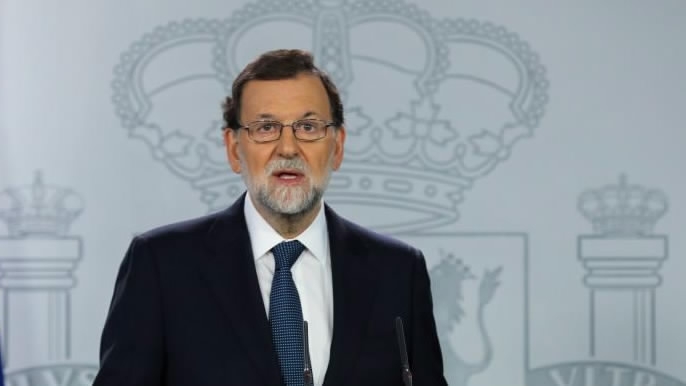
Politics
20:19, 21-Oct-2017
Catalan leader asks regional parliament to debate 'attacks' by Spanish central government
CGTN

The people of Catalonia cannot accept the "illegal" measures taken by the Spanish government to rule the region directly from Madrid, Catalan leader Carles Puigdemont said on Saturday, as he called on the regional parliament to act against them.
Puigdemont said the decision by Prime Minister Mariano Rajoy to fire the regional government and force a new election, which will be effective next Friday, was "the worst attack against the institutions and the people of Catalonia since the military dictatorship of Francisco Franco."
"I ask the parliament to meet in a plenary session during which we, the representatives of the citizens’ sovereignty, will be able to decide over this attempt to liquidate our government and our democracy and act in consequence," Puigdemont said in a televised speech.
Calls for elections
Spain's Prime Minister Mariano Rajoy on Saturday said he would curb the powers of the parliament of Catalonia, sack its government and call an election within six months in a bid to thwart a drive by the autonomous region to break away from Spain.

Rajoy made the remarks at a press conference on the future of Catalonia after an extraordinary cabinet meeting earlier on Saturday.
Catalonia's regional government held a referendum on 1 October, which Catalan leader Carles Puigdemont said resulted in a 90 percent vote in favor of breaking away from Spain.
A spokesman for Puigdemont's government said he would respond at 9 p.m. (1900 GMT).
What is Cabinet's decision?
Rajoy said his government had no choice but to invoke Article 155 of the 1978 Spanish constitution as the Catalonian government acted in a way that was "unilateral, contrary to the law and seeking confrontation" in holding a banned independence referendum in the northeastern region.
The Spanish government also justified the decision based on "rebel, systematic and conscious disobedience" of the regional government of Catalonia, Generalitat.
Rajoy explained that the regional government of Catalonia, Generalitat, would be dissolved, their powers would be controlled by the Spanish ministries and elections would be carried out in a normal way within six months. He is also requesting that all of Puigdemont's government be stripped of their functions, which "in principle will be carried out by (national) ministers for the duration of this exceptional situation."
The Spanish government has four aims behind the decision, Rajoy said. These are to return to legality; to restore normality and coexistence in Catalonia; to continue the region's economic recovery; to hold elections in conditions of normality.

Spain's Prime Minister Mariano Rajoy speaks during a press conference at the Moncloa Palace in Madrid, Spain, October 21, 2017. /Reuters Photo
Spain's Prime Minister Mariano Rajoy speaks during a press conference at the Moncloa Palace in Madrid, Spain, October 21, 2017. /Reuters Photo
Meanwhile, the prime minister also called for calm, normality and cohabitation to Catalonia's people.
The cabinet's unprecedented steps need to be approved by the Senate, where a final vote is scheduled for October 27. Rajoy's conservative Popular Party (PP) holds a majority in the Senate, meaning the proposals are likely to pass.
What is Article 155?
According to Article 155 of the Spanish constitution, it allows the central government to directly impose rule over Spain's semi-autonomous regions in critical situations. It has never been applied in Spain.
The law allows Madrid to intervene if a regional government "doesn't comply with the obligations of the constitution or other laws it imposes or acts in a way that seriously undermines the interests of Spain."
Catalonia currently enjoys significant autonomy from Spain, including control over its own policing, education and healthcare.
"The autonomy is not suspended, nor the government," Rajoy said during the press conference. "People are removed who put the government outside the law, outside the constitution and outside statutes."
What are the economic concerns behind?
Rajoy said the Catalan economy could drop by up to 30 percent if it goes independent and argued latest data on the Catalan economy is "worrying."
According to AFP, nearly 1,200 companies based in Catalonia have re-registered in other parts of Spain since the referendum, hoping to minimize instability.
Catalonia occupies a fifth of Spain's economic output, and supporters of independence argue the region contributes too much to the national economy.

Pro-independence supporters gather around the Catalan parliament in Barcelona on Oct. 10, 2017. /VCG photo
Pro-independence supporters gather around the Catalan parliament in Barcelona on Oct. 10, 2017. /VCG photo
However, those opponents claim that Catalonia is stronger as part of Spain and independence would lead to economic disaster for the country as a whole.
Rajoy also pointed out independence will put Catalonia outside the EU and make the region poorer.
(With inputs from agencies)
9232km

SITEMAP
Copyright © 2018 CGTN. Beijing ICP prepared NO.16065310-3
Copyright © 2018 CGTN. Beijing ICP prepared NO.16065310-3